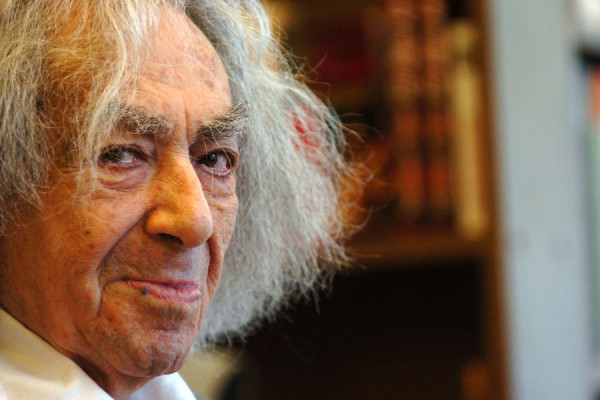(Content Warning: brief mention of suicide, discussion of Nazis, discussion of communism)
György Faludy, a white older man with grey hair smiling at the camera
György Faludy ranks high on the list of revolutionary bisexual writers. Considering the people he shares that category with, this is no small thing. A Jewish man who was born in Hungary and spent most of his life in love with his home country, he was the picture of a patriot. In that, he got in scuffles with the state more than once. Upon finding, again and again, the affection he lavished upon his homeland to be unreturned, he lavished more, from a distance when he had to. He was a man who was remembered as having “... lived everywhere, met everybody, and was ousted from everywhere,” in the invitation to his 95th birthday party.
Though he had wanted to be a poet since he was young, it was not always Faludy’s intended career path. With a father who thought Hungary had 20,000 too many poets already, Faludy was to follow in his father's footsteps and become a scientist. He was sent to the University of Vienna to study chemical engineering, but this was not meant to be. Instead of paying attention to his classes, he translated the work of a rebellious 15th-century French poet by the name of François Villon and launched his literary career.
It was in 1938 that his writing first became too rebellious, as he wrote poetry that remained firmly against Hitler and the rise of Nazism. His outspoken work, as well as the prevalent antisemitism, would have landed him in prison for 14 years if not for the wife of a judge, a fan of Faludy's work. The judge tipped him off, giving Faludy a chance to flee to Paris. Unfortunately, upon the Nazi’s first occupation of France in 1940, Faludy and his first wife, Vali, were forced to flee to Morocco. In 1941, Faludy went to America to join the Movement of Free Hungarians as the editor of their newspaper. In 1943, he enlisted in the army.
He was finally able to return to Hungary in 1946, though the war had changed his home. He became the literary editor for the social democratic daily Nepszava, which translates to “Voice of the People”. 1948, Hungary had become a Stalinist state, and it was not long until the brutal effects took a toll on Faludy. He would remember the 40s later in one of his poems, saying, “My aunt cut her neck with a razor blade. The rest died in the war in gas chambers. My sister floats upon the icy Danube.”
At the close of the decade in 1949, Faludy was falsely accused of working with the CIA and was sent to a labour camp in Recsk for three years. Within the labour camps, Faludy was able to continue his writing. This is not to say that the labour camps weren’t strict; of the hundreds of people Faludy shared a prison with, only 21 survived. Faludy remembered later in life the experience of writing his poetry in the labour camp using the straw from a broom onto toilet paper with his own blood for ink. When this method was not possible, Faludy instead committed his poems to memory. He didn’t just write in the camps; he also taught history, philosophy, and literature classes with his fellow inmates. This is all known because of what is arguably his most well-known work, a record of this time in his life called My Happy Days in Hell.
After his eventual release, he stayed in Hungary. After Stalin’s death, he was able to be with his country as it moved to a more liberal regime. He did eventually leave when the revolution of 1956 was successfully repressed and fled with his family to London. There, he edited an emigré publication, Irodalmi Újság, with support from the Congress of Cultural Freedom. It was in London in 1962 that he published My Happy Days in Hell, but it would be 25 years before the book would be seen in Hungary. Even then, it was in samizdat form, which is to say there was clandestine copying and distribution as the literature was banned by the state.
It was in that same year that Faludy was struck again, but this time by the death of his second wife, Zsuzsa. He then moved to Malta to recover from the blow when Eric Johnson found him.
An American dancer and Hungarian poet, their love story is one for the ages. Eric Johnson had found Faludy’s work and had fallen in love with the writing and the writer. He set his sights on Faludy, but he was not a man to come unprepared. Before they even met, Eric Johnson visited Faludy’s home country, Hungary, to learn Faludy’s native language. It is important now to note that Johnson was not given an easy task in his trip to Hungary, as the country was rife with political turmoil and social struggle. In fact, the fact he entered and left the country so easily could be seen as nothing short of a miracle. It was then, by possible miracle again, that Johnson searched for Faludy, and found him in Malta, showing up at his door in a fashion that one has to guess was quite dramatic, and from there, the two fell in love.
They later moved to New York, America, and then Toronto, Canada, where Faludy taught and wrote for much of his later life. They lived together with two birds who would sit on Faludy’s typewriter as he wrote. They lived together for 37 years and loved each other deeply.
But in 2002, their relationship ended. Faludy remarried but lived in a separate house and never consummated the marriage with the woman. Johnson moved to Nepal, where he would die only two years later.
The end of their love story is sad, but an ending does not diminish the 37 years of love and care that the two gave each other, and their relationship shall be remembered as beautiful.
Faludy later remarried once again, shortly after being diagnosed with cancer. Fanny Kovacs was 27 years old when he was 91, and they lived in Hungary, where Faludy spent the last of his days in the place he loved most of all, his work finally unbanned for the first time in four decades. The city authorities gave him a flat in Dunabe, and he died at age 95.
From a bird’s eye view, Faludy’s life is a love letter to Hungary. Over and over, he chose his country, loving it, holding it accountable for its mistakes, being hurt by it, fighting for it, leaving it, and in the end, despite everything, returning to it.
A life filled with changes and one dramatic event after another, he found his rock, and he never let it go. Even when it seemed like he had, he was always a step away from coming back to it. Through the Second World War, his marriages, imprisonment, and communism, he always came back. So it is fitting that his life ended with one more triumphant reunion with Hungary. He was welcomed back and finally given back some of the love he had given to it.
Looking at him now, it seems like he is a model citizen. A man who rebelled, worked, and loved his country, he becomes a symbol of love through growth. Not loving something so much as to enable all of its flaws, but loving it through its growth, and pushing it to keep going. A man who knocked over a statue of an antisemitic bishop, wrote revolutionary poetry, and was thrown in prison for three years is the picture of a loyal citizen.
[Disclaimer: Some of the sources may contain triggering material.]
Amiel, Barbara. “George Faludy Got Married at 91 and Said Goodbye to Eric.” The Telegraph, Telegraph Media Group, 12 Aug. 2002.
Faludy, György. “Learn by Heart This Poem of Mine.” Google, Open Democracy, 3 Sept. 2006.
Goff, Samuel. “Unreleased Works by Hungarian Author György Faludy to Go under the Hammer.” The Calvert Journal, CALVERT 22 FOUNDATION, 4 Nov. 2015.
Gomori, George. “Obituary: Gyorgy Faludy.” The Guardian, Guardian News and Media, 8 Sept. 2006.
“György Faludy.” Hungarian Review, BL Nonprofit Kft.
“Gyorgy Faludy.” The Economist, The Economist Newspaper, 16 Sept. 2006.
http://www.c3.hu/~eufuzetek/en/eng/14/index.php?mit=faludy
Reuters. “Gyorgy Faludy, 95, Hungarian Poet and Figure in Resistance, Dies.” The New York Times, The New York Times, 3 Sept. 2006.


